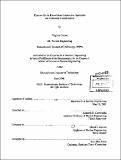Thorium oxide dissolution kinetics for hydroxide and carbonate complexation
Author(s)
Curran, Virginia, 1977-
DownloadFull printable version (4.438Mb)
Other Contributors
Massachusetts Institute of Technology. Dept. of Nuclear Engineering.
Advisor
Kenneth R. Czerwinski.
Terms of use
Metadata
Show full item recordAbstract
In order to better understand the behavior of thorium breeder reactor fuel in a repository environment, the behavior of thorium oxide was investigated. The kinetics of crystalline thorium oxide dissolution were studied under argon and argon/10% CO2 over a broad pH range in 0.1 M ionic strength NaC1O4 solution. Samples were analyzed for thorium concentration using ICP-AES, ICP-MS, and NAA. Data was fit to a first order kinetics model. The kinetic rate constant under pure argon was 0.0107 ± 0.00123 h-1 for pH 2-3. Under 10% CO2, the rate constant was 0.00511 ± 0.000863 h-1. No kinetics results could be discerned from the data at higher pH. Under argon, solubility at pH greater than 3 was at nm/L levels, three orders of magnitude lower than at pH 3 and below. Under 10% CO2, solubilities decreased from 10 [mu]mol/L at pH 2.06 to 80 nm/Lat pH 3. Thorium oxide powder remnants from each experiment were analysed using XRD, FflR, and BET surface area analysis. Surface area analysis showed a 15% increase in surface area at pH 10 and higher under argon, and a uniform surface area increase of 15 to 30% under 10% CO2. XRD and FfIR spectra showed that the thorium oxide was otherwise identical to the untreated standards.
Description
Thesis (S.M.)--Massachusetts Institute of Technology, Dept. of Nuclear Engineering, 2001. Includes bibliographical references (p. 64-66).
Date issued
2001Department
Massachusetts Institute of Technology. Department of Nuclear Engineering; Massachusetts Institute of Technology. Department of Nuclear Science and EngineeringPublisher
Massachusetts Institute of Technology
Keywords
Nuclear Engineering.